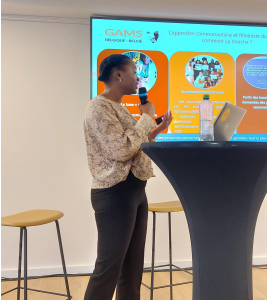
Different stakeholders in Belgium’s international cooperation are invested in advancing sexual and reproductive health and rights (SRHR) in low- and middle-income countries. They are seeking to advance maternal health, access to abortion, comprehensive sexuality education, the sexual violence response, the prevention of female genital mutilation/cutting, … Decolonising cooperation on SRHR and making progress on the ground requires us however to decenter the European point of view. Programmes risk failing if we do not understand people’s needs, local knowledge and points of view, and if we forgo people’s agency.
Some actors have already taken concrete practical steps rethinking the design and implementation of programmes. They shared their insights as the Be-cause Health conference on taboos in global health.
Dorcus Achen, PhD in gender and diversity at VUB and ICRH-affiliated researcher at the Mbarara University of Science & Technology in Uganda, worked on the improvement of Adolescent Sexual and Reproductive Health through a Participatory Parent-Child Communication Intervention in Uganda. Traditionally, sexuality and sexual health were topics about which adolescents would receive guidance by aunties and uncles within their extended families. With the shift to nuclear families, parent-child communication on the matter has become ever more needed. Actively engaging parents, schools, religious leaders as well as adolescents themselves allowed to develop a project wherein parents build confidence and knowledge to engage in parent-child conversations around the changes their teens go through in their transitions into adulthood, including on menstrual health, bodily changes, etc.
Fara Djiba, Executive Director of AFASCO (L’ ONG d’Accompagnement des Forces d’Actions Sociocommunautaires), partner organization of GAMS in Guinéé and Marianne Nguena of GAMS-Belgique explained how they promote reproductive health and family planning in communities and schools, including through inter-generational community dialogues, and the set-up of local protection committees to protect girls from FGM, and the training of traditional birth attendants and women who practice cutting about the dangers of FGM and possible alternatives rites of passage.
In DRC, UNIKIS has been partnering with Enabel on the sexual violence response. Professor Augustin Mukieke Researcher of Kisangani University (UNIKIS) explained the grounded research that was undertaken to better understand the local drivers of sexual violence, to ensure a more effective response. UNIKIS has played a prominent role, from data collection to the development of treatment protocols, drafting of policy briefs shared with local decision-makers and training of service providers. This experience demonstrated how local research capacities can be leveraged in SRHR programming and how, with increased support globally, this could help develop more locally-owned, adapted and responsive SRHR programmes.
Dorcus Achen, PhD in gender and diversity at VUB and ICRH-affiliated researcher at the Mbarara University of Science & Technology in Uganda, worked on the improvement of Adolescent Sexual and Reproductive Health through a Participatory Parent-Child Communication Intervention in Uganda. Traditionally, sexuality and sexual health were topics about which adolescents would receive guidance by aunties and uncles within their extended families. With the shift to nuclear families, parent-child communication on the matter has become ever more needed. Actively engaging parents, schools, religious leaders as well as adolescents themselves allowed to develop a project wherein parents build confidence and knowledge to engage in parent-child conversations around the changes their teens go through in their transitions into adulthood, including on menstrual health, bodily changes, etc.
Fara Djiba, Executive Director of AFASCO (L’ ONG d’Accompagnement des Forces d’Actions Sociocommunautaires), partner organization of GAMS in Guinéé and Marianne Nguena of GAMS-Belgique explained how they promote reproductive health and family planning in communities and schools, including through inter-generational community dialogues, and the set-up of local protection committees to protect girls from FGM, and the training of traditional birth attendants and women who practice cutting about the dangers of FGM and possible alternatives rites of passage.
In DRC, UNIKIS has been partnering with Enabel on the sexual violence response. Professor Augustin Mukieke Researcher of Kisangani University (UNIKIS) explained the grounded research that was undertaken to better understand the local drivers of sexual violence, to ensure a more effective response. UNIKIS has played a prominent role, from data collection to the development of treatment protocols, drafting of policy briefs shared with local decision-makers and training of service providers. This experience demonstrated how local research capacities can be leveraged in SRHR programming and how, with increased support globally, this could help develop more locally-owned, adapted and responsive SRHR programmes.

 RSS Feed
RSS Feed